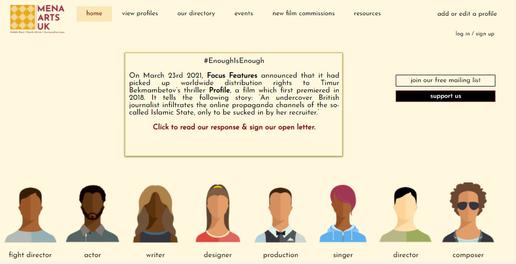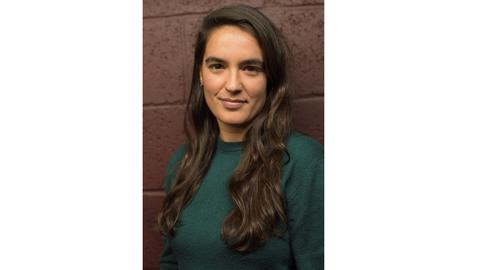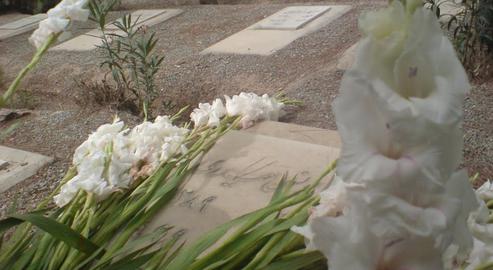“I can’t believe there are so many of us.”
This was the repeated exclamation that the co-founders of pioneering arts organization MENA Arts UK heard during some of their first group discussions in 2020.
The participants were live and recorded arts professionals based in the United Kingdom and with links to the Middle East, North Africa and surrounding countries. Many had well-established careers, but few felt they had had a support network to call their own – until now.
MENA Arts UK was set up last summer to showcase and champion the talents of MENA+ creatives in Britain. There are thousands upon thousands of them, but many have struggled to achieve the recognition they deserve in an often-exasperating work environment.
The project was the brainchild of Kerry Kyriacos Michael, who was artistic director of London’s Theatre Royal Stratford East for 13 years, and the Palestinian-Libyan actor Ramzi Dehani. It brings together UK-based artists with links to Afghanistan, Algeria, Armenia, Assyria, Bahrain, Cyprus, Egypt, Iran, Iraq, Israel, Jordan, Kurdistan, Kuwait, Lebanon, Libya, Mauritania, Morocco, Oman, Palestine, Qatar, Saudi Arabia, South Sudan, Sudan, Syria, Tunisia, Turkey, the United Arab Emirates, Western Sahara and Yemen.
Iranians are well-represented on the fledgling platform, with five people of Iranian origin on the initial 12-strong steering group, including Iranian-German producer Penny Babakhani, British-Iranian actress and screenwriter Shireen Farkhoy and British-Iranian actor Arian Nik. More than 40 other people with links to Iran have already listed themselves on the platform’s live directory of UK-based talent.
“We’ve had an incredible response,” Lanna Joffrey, an Iranian-born actor and writer, told IranWire. “There’s not been an organization like this before that unifies us and brings us together. We don’t discriminate between people; we celebrate their artistry.”
Combating Stereotypes
Directors, playwrights and performers with backgrounds in the MENA+ region often face a set of specific obstacles in the West that their non-MENA+ colleagues may not appreciate. They are often typecast onscreen or only offered a platform if their work panders to pre-existing stereotypes.
Lanna Joffrey, who is currently building a database of MENA+ playwrights, notes: “The plays that get considered are the ones where we suffer – where there’s absolute tragedy connected to violence and terrorism. People aren’t willing to invest in our joy.”
In early April 2021, MENA Arts UK published its first open letter, objecting to a plan by Focus Features to re-distribute a 2018 film called Profile, in which a British journalist infiltrates militant extremist groups online, then falls in love with an ISIS fighter.
“The marketing alone relies on damaging tropes without any regard for the harm this will cause,” the more than 200 co-signatories said. “When audiences only know to associate us with violence and oppression, it becomes easier for politicians to subject us to... persecution through blatantly racist and Islamophobic legislation.”
Part of MENA Arts UK’s work, Joffrey says, is to highlight the incredible diversity of the region in terms of cultural heritage and religion – including the fact that many versions of Islam are practiced – but also of physical appearance. In February 2021 the platform hosted a live event, entitled But You Don’t Look Middle Eastern?. “We are constantly having to prove our Middle Eastern-ness,” Joffrey says. “There are barriers there we need to break down.”
MENA+ performers often struggle to be cast in general, let alone in non-stereotypical, roles. A September 2020 study that examined 1,300 popular films between 2007 and 2019 found that the prevalence of Middle Eastern and North African characters on screen was never higher than 3.4 percent.
MENA Arts UK co-vice chair Sepy Baghaei, a theatre director of Iranian origin who grew up in Australia, told IranWire: “A lot of actors say that they also want to play the everyman; they want to be Middle Eastern, but also have the freedom to play characters that aren’t tied to their ethnicity or heritage. We don’t just want to be one thing.
“It also feels very frustrating to see people not from the MENA+ region telling MENA+ stories. People constantly say, ‘There’s not enough MENA+ people to cast in my show’. This website and this database are here as an answer, to say: ’That’s not true, we’re here, use us’. We have to be part of that work.”
Both Baghaei and Joffrey are also keen to ensure that young would-be creatives from the MENA+ region feel confident in choosing the arts as a future vocation – just as much as they would in entering other careers such as pharmaceuticals, engineering or business. “People from MENA+ communities aren’t always encouraged to go down this route,” Baghaei says. “I’d like to change that for generations coming through now.”
What Help is on Offer?
The new website has a dedicated space for UK-based MENA+ writers, directors, performers and other professionals to upload and update their personal biographies. There are already more than 200 professionals listed on the site, and within months of the launch it has already led to castings.
Last December MENA Arts UK also commissioned a series of eight short films by artists and filmmakers celebrating what they had in common, and the diversity of their talent. Three of the commissioned artists, Majid Adin, Maral Mamaghanizadeh, and Peyvand Sadeghian, are Iranian and their works can now be viewed on the website.
After a series of successful online events, the co-founders are now preparing for a world after lockdown. “The pandemic was what got us all in that first Zoom room,” Baghaei says. “There were so many conversations about accessibility, representation and Black Lives Matter. The challenging thing now will be to slot that around our own lives as working artists.”
In the coming months the organization plans to register as a charity and examine new ways it can support and advocate for MENA+ artists in the UK. People with links to one of the countries covered can sign up and create a profile by visiting the website, menaarts.uk.
visit the accountability section
In this section of Iran Wire, you can contact the officials and launch your campaign for various problems




























comments